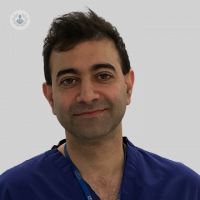Gynaecological causes of heavy bleeding
Written in association with:Heavy menstrual bleeding, also known as menorrhagia, is a common concern for many women and can be caused by a variety of gynaecological conditions. It refers to an unusually heavy or prolonged menstrual period that interferes with daily activities and may cause significant discomfort or health issues, such as anaemia. Understanding the possible gynaecological causes of heavy bleeding can help in determining the best course of treatment.

What is considered heavy bleeding?
Heavy menstrual bleeding is typically defined as losing more than 80 millilitres of blood during one menstrual cycle or having periods that last longer than seven days. However, this is very difficult to measure and not that useful in practical life. Clinically, heavy menstrual bleeding is accepted as being heavy if it adversely affects the quality of life for a patient with its symptoms, such as:
- Needing to change sanitary protection constantly, for example; every hour.
- Passing large blood clots.
- Experiencing symptoms of anaemia, such as fatigue and dizziness.
What are the common gynaecological causes of heavy bleeding?
Several gynaecological conditions can lead to heavy bleeding. These include:
Abnormal uterine bleeding
This accounts for approximately 70 per cent of patients who suffer with heavy menstrual bleeding. It is heavy menstrual bleeding in the absence of a cause such as those below.
Uterine fibroids
These are non-cancerous growths which develop in the uterus. These can vary in size and number and are one of the most common causes of heavy bleeding. Fibroids can cause the uterus to enlarge, leading to prolonged or excessive menstrual bleeding.
Endometrial polyps
Endometrial polyps are growths on the inner lining of the uterus (endometrium) and can cause irregular or heavy periods. Polyps are usually benign, but they can interfere with the normal shedding of the uterine lining, leading to increased bleeding.
Adenomyosis
This happens when endometrial tissue grows into the uterus’ muscular wall. It can lead to the uterus enlarging, which results in heavy, painful periods and a bloated feeling. Adenomyosis occurs most commonly in women who have had children. It can co-exist in 30 to 50 per cent of patients who also suffer with endometriosis.
Polycystic ovary syndrome (PCOS)
PCOS is a hormonal disorder. It affects the ovaries and may result in irregular periods. Some women with PCOS may experience heavy bleeding during infrequent periods due to a thickened uterine lining. PCOS is also associated with other symptoms, such as excessive hair growth, acne and weight gain.
Hormonal imbalances
Hormonal imbalances, particularly those involving oestrogen and progesterone, can cause heavy periods. This can occur during puberty, perimenopause, or as a result of conditions like hypothyroidism. Without the proper balance of hormones, the uterine lining may build up excessively and cause heavier bleeding.
Miscarriage or ectopic pregnancy
In some cases, heavy bleeding may be a sign of a miscarriage or an ectopic pregnancy (where the pregnancy occurs outside the uterus). Both conditions can cause significant bleeding and require immediate medical attention.
Cancer
In rare cases, heavy menstrual bleeding can be caused by cancer of the uterus, cervix, or ovaries. Women experiencing abnormal bleeding, especially after menopause, should see their doctor for further investigation.
How is the cause of heavy bleeding diagnosed?
To diagnose the cause of heavy bleeding, a doctor may:
- Take a full medical history, including menstrual cycle details.
- Perform a pelvic examination and per vaginal examination +/- pipelle biopsy
- Order blood tests to check for anaemia or hormonal imbalances.
- Recommend an ultrasound scan to detect fibroids, polyps, or other abnormalities.
- Use hysteroscopy (a procedure that allows visualisation of the inside of the uterus) to investigate the uterine cavity and also take a biopsy.
How is heavy bleeding treated?
The treatment of heavy bleeding depends on the underlying cause. Options may include:
- Medications: Hormonal treatments such as birth control pills or progesterone therapy, or non-hormonal medications like tranexamic acid, can help reduce bleeding.
- Surgical options: For more severe cases or structural causes like fibroids or polyps, surgery may be required. Procedures include endometrial ablation (removal of the uterine lining), operative hysteroscopic resection of fibroids, myomectomy (removal of fibroids), or hysterectomy (removal of the uterus).
Heavy menstrual bleeding can have several gynaecological causes, ranging from benign conditions like fibroids to more serious concerns like cancer. If you are experiencing heavy or prolonged periods, it is important to consult a healthcare professional for a thorough evaluation and to discuss appropriate treatment options.


